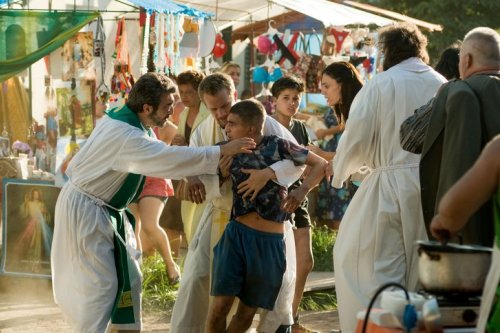Reviews - White Elephant
White Elephant
Reviewed By Vaughan Ames

White Elephant
The cry we always hear for anyone attempting to give up alcohol or drugs is 'Just think one day at a time'. Any attempt to look further into the future is, we are told, futile and will lead to failure. It seems from watching 'White Elephant' that this would be sound advice for anyone who has to work with the poor in a forgotten slum. You won't get anywhere fast and no-one is going to help you, whether they be town councillors, drug barons, building contractors or church leaders.
The film tells us straight away that two of our 'heroes' – Catholic priests – have demons of their own to face. Father Julian's face is covered in an horrendous net as he lies still for a brain scan. As they finish and remove the net we see him panting in near panic; all is not well.
We then go to a village deep in the jungle and follow Father Nicholas who has to watch while villagers are shot rather than give him up to the soldiers; this guilt, of failure to help and of surviving, will haunt him forever. Father Julian goes to the jungle to bring him out and back to Buenos Aires to help him.
We are then introduced to the centre point of the film; a large half-built structure which was supposed to be a hospital but never finished, which is now the home to hundreds of poor people. Set in the middle of a huge shanty town, it is still a 'white elephant' to the locals.
After a night of torrential rain, we begin to see the real job of these priests; yes, they do hold services, but they spend most of their time fighting to ameliorate the conditions of the poor around them, trying to get them fed and watered and trying to get more homes built. They are aided in this by a social worker, Luciana, our third hero.
The enemy seems to be just about everyone else. With so much poverty, it is hardly surprising that drugs are a huge issue, and the local gangs fighting over their turf cause much of the action of the film. One young boy, Monito, is used to bring this battle into the centre of the plot, as the priests try to protect him and the gangs continually pull him back.
In between holding the gangs at bay, the other battle is over the new housing. The council have agreed to have the homes built but where is the money? The workers on the site haven't been paid for weeks and the contractors are threatening to pull out all together. The council claim to have paid the money to the Church; the contractors say they haven't received it. Who is telling the truth? To make it more confusing, the Church is also culpable; is it possible that they have kept the money for themselves..?
This is the background to the film, but the real plot is about the main characters themselves. We see Father Julian as the leader of all the good work. He has been here for years and is well respected by everyone, but is obviously dying slowly and wants to get the houses built before it is too late. He is gradually getting more tired and feeling angry at all those around him. Continually holding everyone together and trying to get the Church bishops to get more involved, he is losing his faith in ever getting the slum conditions improved.
Father Nicholas wants to assuage his guilt by getting more 'hands on' in helping the poor here; we see him go into the heart of one of the gang's headquarters to retrieve a dead body for the other gang, only to get told off by Father Julian for risking their neutrality. This difference in tactics continues, testing their friendship.
Luciana, meanwhile, is also fed up with continually fighting all sides; she it is who brings up the other elephant in the room - are the church leaders corrupt too?
Working together continually, Nicholas and Luciana are gradually getting closer until the inevitable happens and they fall into bed together. Is this the end of his faith? Will they leave the slum? What will happen to everyone when Julian dies?
We are to find out quicker than we expected. The police raid the slum to find Monito who has shot a policeman. We are with Julian and Nicholas trying to bandage some of the many injured when Monito is carried in with a bad wound. Both of the Fathers attempt to drive him to a hospital but are stopped at a police checkpoint. In their attempts to protect Monito, Father Julian is shot by the police and killed.
Then follows a bit a strange ending; Nicholas is seen in retreat in a Monastery before going back to the funeral cortege of Julian, who has become a martyr to the locals. Nicholas is walking with the crowd but gradually stops and we see him looking out over the shanty houses. Many critics and some of our audience didn't like this; personally I felt we were being shown that Nicholas had seen his path at last. He would continue the fight against his own guilt, continue to fight to improve the lot of these people; he had realised that nothing would happen overnight, that 'one day at a time' was all he could hope for.
Pablo Trapero, who directed this film, has many awards already for his films, which tend to concentrate on the human drama behind the political. Keswick has had both 'Lion's Den' and 'Carancho' in recent years. 'White Elephant' continued his theme well for me, but possibly could have packed a bigger punch if the story had been tighter; I loved the fact that he left it to the audience to work out what was going on, but, in doing that, it did make the film wander a bit.
The photography was fantastic, really bringing out the poverty of the slums and placing the viewer in the action during the raid, for which we can thank Trapero's long-time Cinematographer Guillermo Nieto. The acting too was good, thanks to two of his regular actors - Ricardo Darin (Father Julian) and Martina Gusman (Luciana) - plus Jeremie Renier (Father Nicholas); Trapero likes to work with the same people; maybe not so surprising with Martina Gusman as she is his wife!
Overall, this was a good film for me and for the majority of the audience. Let's hope next week's film is as good. We have the first film from British director Rufus Norris – an indie drama set in North London called 'Broken' starring Tim Roth, Rory Kinnear and Cillian Murphy and introducing a new youngster Eloise Laurence.
The film tells us straight away that two of our 'heroes' – Catholic priests – have demons of their own to face. Father Julian's face is covered in an horrendous net as he lies still for a brain scan. As they finish and remove the net we see him panting in near panic; all is not well.
We then go to a village deep in the jungle and follow Father Nicholas who has to watch while villagers are shot rather than give him up to the soldiers; this guilt, of failure to help and of surviving, will haunt him forever. Father Julian goes to the jungle to bring him out and back to Buenos Aires to help him.
We are then introduced to the centre point of the film; a large half-built structure which was supposed to be a hospital but never finished, which is now the home to hundreds of poor people. Set in the middle of a huge shanty town, it is still a 'white elephant' to the locals.
After a night of torrential rain, we begin to see the real job of these priests; yes, they do hold services, but they spend most of their time fighting to ameliorate the conditions of the poor around them, trying to get them fed and watered and trying to get more homes built. They are aided in this by a social worker, Luciana, our third hero.
The enemy seems to be just about everyone else. With so much poverty, it is hardly surprising that drugs are a huge issue, and the local gangs fighting over their turf cause much of the action of the film. One young boy, Monito, is used to bring this battle into the centre of the plot, as the priests try to protect him and the gangs continually pull him back.
In between holding the gangs at bay, the other battle is over the new housing. The council have agreed to have the homes built but where is the money? The workers on the site haven't been paid for weeks and the contractors are threatening to pull out all together. The council claim to have paid the money to the Church; the contractors say they haven't received it. Who is telling the truth? To make it more confusing, the Church is also culpable; is it possible that they have kept the money for themselves..?
This is the background to the film, but the real plot is about the main characters themselves. We see Father Julian as the leader of all the good work. He has been here for years and is well respected by everyone, but is obviously dying slowly and wants to get the houses built before it is too late. He is gradually getting more tired and feeling angry at all those around him. Continually holding everyone together and trying to get the Church bishops to get more involved, he is losing his faith in ever getting the slum conditions improved.
Father Nicholas wants to assuage his guilt by getting more 'hands on' in helping the poor here; we see him go into the heart of one of the gang's headquarters to retrieve a dead body for the other gang, only to get told off by Father Julian for risking their neutrality. This difference in tactics continues, testing their friendship.
Luciana, meanwhile, is also fed up with continually fighting all sides; she it is who brings up the other elephant in the room - are the church leaders corrupt too?
Working together continually, Nicholas and Luciana are gradually getting closer until the inevitable happens and they fall into bed together. Is this the end of his faith? Will they leave the slum? What will happen to everyone when Julian dies?
We are to find out quicker than we expected. The police raid the slum to find Monito who has shot a policeman. We are with Julian and Nicholas trying to bandage some of the many injured when Monito is carried in with a bad wound. Both of the Fathers attempt to drive him to a hospital but are stopped at a police checkpoint. In their attempts to protect Monito, Father Julian is shot by the police and killed.
Then follows a bit a strange ending; Nicholas is seen in retreat in a Monastery before going back to the funeral cortege of Julian, who has become a martyr to the locals. Nicholas is walking with the crowd but gradually stops and we see him looking out over the shanty houses. Many critics and some of our audience didn't like this; personally I felt we were being shown that Nicholas had seen his path at last. He would continue the fight against his own guilt, continue to fight to improve the lot of these people; he had realised that nothing would happen overnight, that 'one day at a time' was all he could hope for.
Pablo Trapero, who directed this film, has many awards already for his films, which tend to concentrate on the human drama behind the political. Keswick has had both 'Lion's Den' and 'Carancho' in recent years. 'White Elephant' continued his theme well for me, but possibly could have packed a bigger punch if the story had been tighter; I loved the fact that he left it to the audience to work out what was going on, but, in doing that, it did make the film wander a bit.
The photography was fantastic, really bringing out the poverty of the slums and placing the viewer in the action during the raid, for which we can thank Trapero's long-time Cinematographer Guillermo Nieto. The acting too was good, thanks to two of his regular actors - Ricardo Darin (Father Julian) and Martina Gusman (Luciana) - plus Jeremie Renier (Father Nicholas); Trapero likes to work with the same people; maybe not so surprising with Martina Gusman as she is his wife!
Overall, this was a good film for me and for the majority of the audience. Let's hope next week's film is as good. We have the first film from British director Rufus Norris – an indie drama set in North London called 'Broken' starring Tim Roth, Rory Kinnear and Cillian Murphy and introducing a new youngster Eloise Laurence.
Find A Film
Search over 1500 films in the Keswick Film Club archive.
Friends
KFC is friends with Caldbeck Area Film Society and Brampton Film Club and members share benefits across all organisations
Awards
Keswick Film Club won the Best New Film Society at the British Federation Of Film Societies awards in 2000.
Since then, the club has won Film Society Of The Year and awards for Best Programme four times and Best Website twice.
We have also received numerous Distinctions and Commendations in categories including marketing, programming and website.
 Talking Pictures
The KFC Newsletter
Talking Pictures
The KFC Newsletter
Links Explore the internet with Keswick Film Club


